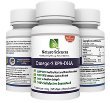Sometimes I love to tell long stories and take a lot of time to research one single topic.
Some other times I come across smaller news items related to getting pregnant after 35 which are not big or interesting enough to develop into articles, but could potentially be important for some of you. So today I will list five fertility-related news items from the past weeks that I found remarkable:
1. Women with certain genetic disorders can tend to have fewer eggs.
Women with infertility issues often worry that there could be some greater plan behind them not being able to conceive.
Well, there may be something behind it. Every now and then I come across reports of various genetic disorders and disease-causing mutations being linked to infertility.
As if nature were trying to minimisethe risk that infants of certain motherswould be born prematurely or be stillborn ?
Or maybe vice versa? Maybe nature was making sure that women who carry certain “risky genes” don’t become mothers too late in life, avoiding to put too heavy aload on their backs?
Anyway, it has recently been shown that women with the gene BRCA1 (which often causes breast cancer) have fewer eggs.
After adjusting for all factors that affect hormone levels: age, oral contraceptive use, body mass index a and smoking, the researchers found that women with BRCA1 mutations had 25 percent lower AMH concentration than non-carriers. This is the equivalent of a two-year age increase for a non-carrier woman in her 30s. So at age 35, a woman who carries this mutation has the eggs of a 37 year-old who does not.
2. DHEA is safe!
DHEA is really, totally and definitely safe to use in the dosages recommended for improving egg quality.
I keep repeating this all over the blog and it is still one of the most commonly asked questions.
Here is what Mayo clinic has to say about safety of DHEA:
“…DHEA is likely safe when taken by mouth in doses that restore normal DHEA and DHEA-S levels and under the care of a health professional. Doses of up to 1,600 milligrams of DHEA taken by mouth daily for one month have been well tolerated (please compare to 50-75mg doses taken when improving egg quality!). A dose of 50 milligrams of DHEA taken by mouth daily has been shown to be safe for up to six months. In women, DHEA may cause decreased breast size, a deep voice, increased genital size, irregular periods, oily skin, and unnatural hair growth…”
This does not mean that this will happen to you – in all the years that I have been researching this topic, only two or three times have I heard of women having acne and increased sweating as a side-effect of taking DHEA (one lady had rashes, but it is still uncertain whether this was caused by DHEA or some other compound from the capsule itself).
But honestly, how serious are these side-effects if you are trying to improve your eggs and give them a fair chance ofmaturing and growing into good quality embryos?
3.Do embryos have to look perfect to be implanted?
Another issue which I sometimes discuss with couples is: Can morphologically bad-looking embryos develop into healthy babies? And what about PGS?
There are often concerns that granular embryo morphology on Day 3 may be a poor predictor of further development and implantation potential. This seems to be untrue. On the other hand, various other abnormalities, such as altered polar bodies or presence of cytoplasmic vacuoles did relate to a reduced developmental potentialof embryos and ultimately lowered pregnancy rates. There is more you can read on these two studies here: http://www.ncbi.nlm.nih.gov/pubmed/26815385
http://www.ncbi.nlm.nih.gov/pubmed/12948093
4. Children of older mothers do better.
Most previous research suggests that the older the woman when she gives birth, the greater the health risks for their children.
While childbearing after 35 carries an increased risk of negative pregnancy outcome such as Downs syndrome, as well as an increased risk that the child will develop Alzheimer’s disease, hypertension, and diabetes later in life, children may also benefit from mothers delaying childbearing until an older age.
These are the findings from a new study conducted by Mikko Myrskylä, the director of the Max Planck Institute for Demographic Research (MPIDR) and his colleague Kieron Barclay at the London School of Economics, that has been published in the Population and Development Review. Children of older mothers are healthier, taller and obtain a better education than the children of younger mothers. The reason is that in industrialized countries educational opportunities and standard of living are increasing, and people are getting healthier by the year.
5. The Infertility business is growing rapidly.
The prevalence of infertility and associated disorders is on the rise. In the past year, about 10% of married women in the US, aged between 20 and 44 years, had issues with infertility.
And what do women with infertility issues do? They mobilize the available financial resources and try their luck with IUI, IVF, or ICSI. Given the number of treatments that is needed on the average to come home with a baby, you may not be surprised to hear that the fertility services market in the US is estimated to generate a revenue of about 6.6 billion by 2020, growing at an amazing rate of over 8% per year.
I’m so overwhelmed by those numbers (here you can read more) – hopefully you can make more sense out of them then I can!
Supplements which are scientifically proven to increase egg quality:
To know when you ovulate:
Prenatal vitamins:
















